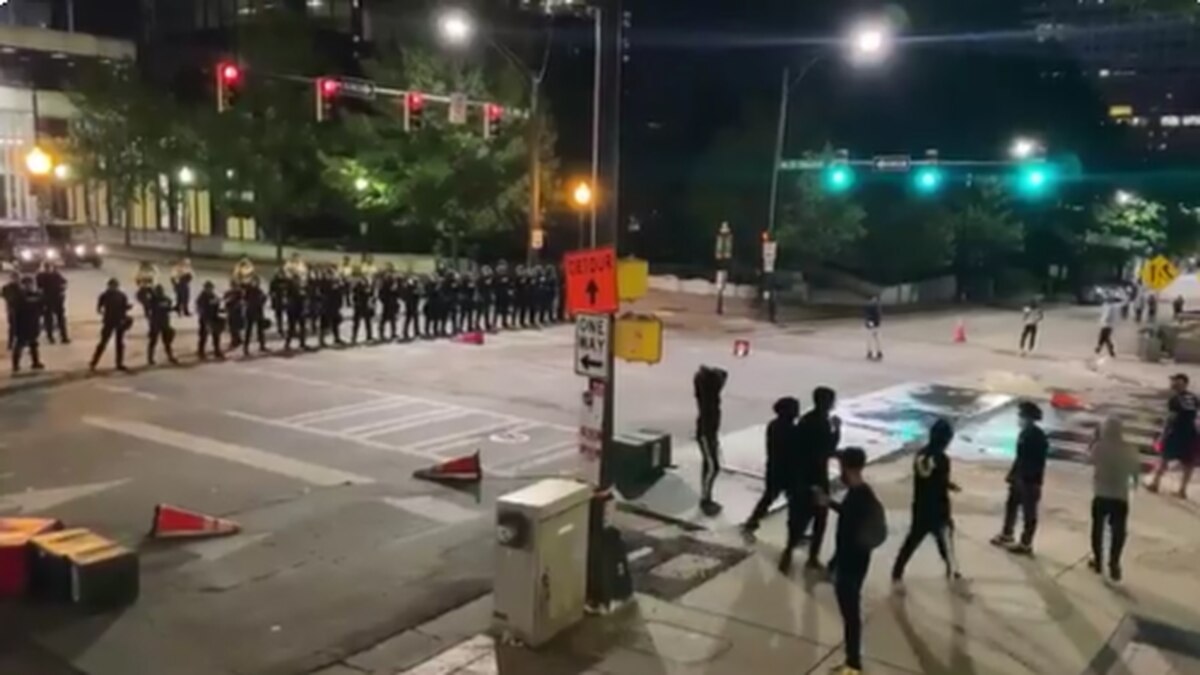
PROTESTS IN CHARLOTTE. Photo: WBTV
June 10. By Dave Yochum. The Mecklenburg County Sheriff’s Office is removing tear gas from its list of allowable uses of force to quell riots and out-of-control crowds. The use of chemical irritants such as tear gas especially during times of civil unrest has been a standard for law enforcement as a less-than-lethal use of force option.
But with tensions mounting between law enforcement and the communities they serve, Sheriff Garry McFadden said it was “prudent to take another approach in response to the pain, frustration and national outcry against police brutality.”
“I would rather have meaningful conversations and engagement that build relationships and bonds with the community so that tear gas never has to be used. Throughout the past two weeks I’ve heard the cries of the community and during the midst of the COVID-19 pandemic, protecting our citizens is vital,” McFadden said.

MCFADDEN
In Charlotte, CMPD says, effective immediately, when police give a dispersal order, both the order and ways for the crowd to leave the area will be announced “loudly, clearly and repeatedly to the crowd.” Meanwhile, the Charlotte City Council has voted to defund $103,000 for chemical agents used to disperse or control crowds.
In Huntersville, Mayor John Aneralla said the Police Department has gone public with a “Duty to Intervene” order should an officer see another officer using excessive force. Choke holds are prohibited unless the officer “believes there is an imminent threat of serious injury or death.”
Huntersville Chief Bence Hoyle said there have been no complaints of excessive force in either 2018 or 2019. On Facebook, he said there are no officers red-flagged as risks, as well as none with any history of use of force violations.

HOYLE
“We are in an unprecedented period where fewer and fewer people are getting into or staying in law enforcement,” he said, explaining that it is disheartening when HPD officers face backlash over what another officer did thousands of miles away.”
In Cornelius, the Police Department “has available, chemical agents that may be used to disperse unruly and destructive crowds, in lieu of physical force, to maintain public order and safety,” Chief Kevin Black said.
Chemical irritants are “OC” and “CS” in law enforcement parlance.
OC is one of the most common and popular forms of pepper spray. OC stands for Oleoresin Capsicum. The active ingredient is capsaicin which is derived from peppers.
CS or tear gas is an agent that can be used alone or is also combined with OC spray for added affects. Various forms can cause mild tearing to immediate vomiting that may put the target in a prone position.

BLACK
Police everywhere have used “riot control agents,” which do not kill, rather than firearms to disperse crowds.
Black said policy around the use of chemical agents “can and does change throughout the year to reflect best practices, new standards and to meet the requirements of new/updated law(s).”
Two town board members said there are no discussions under way to change policies at the department, which is one of only a handful accredited by the Commission on Accreditation for Law Enforcement Agencies. It’s considered the gold standard credentialing authority in law enforcement.
But Black said because of “recent developments in law enforcement we are reviewing our policies that cover the deployment of less lethal options.” Neither he nor Town Manager Andrew Grant would specify what the options might be.
Reflective chief
Chief Hoyle said he understands and accepts that people are frustrated in the wake of George Floyd’s death.
“Just remember that we are here for you, we will faithfully serve you, and we have and will proactively try to prevent this type of incident from ever happening,” he said.




